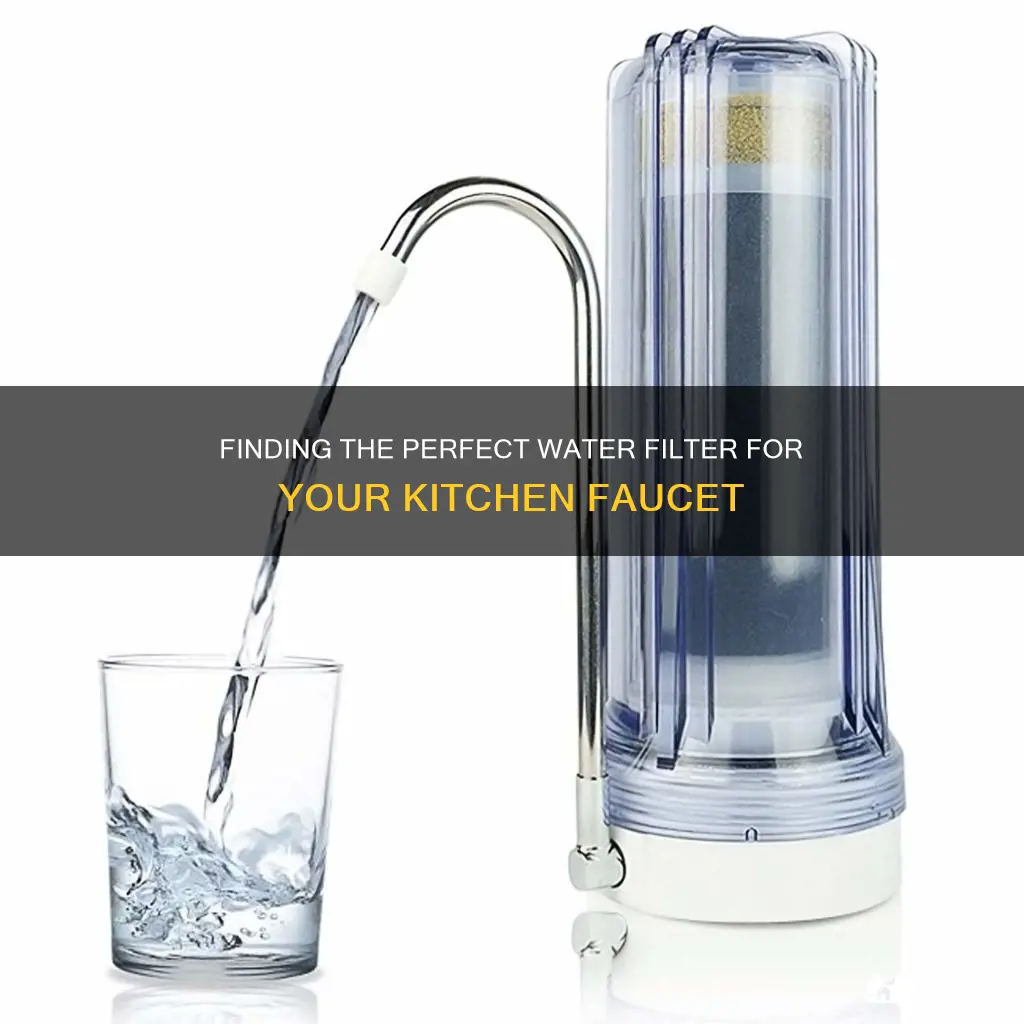
In a world where access to clean and safe drinking water is becoming increasingly important, finding the best water filter for your kitchen faucet is essential. With so many options available on the market, it can be overwhelming to choose the right one. However, in this article, we will explore the top contenders and help you make an informed decision, ensuring that you and your family have access to the best quality water right in your own home.
| Characteristics | Values |
|---|---|
| Filtration | Multi-stage |
| Filter lifespan | 6 months to a year |
| Flow rate | 0.5 - 2 gallons/min |
| Filter type | Carbon |
| Certifications | NSF/ANSI 42, 53, 401 |
| Installation | Tool-free |
| Compatibility | Most standard faucets |
| Filter capacity | 100 gallons |
| Contaminants | Removes chlorine, |
| lead, mercury, | |
| pesticides, | |
| herbicides, | |
| VOCs | |
| Maintenance | Easy cartridge |
| replacement | |
| Warranty | Varies (typically |
| 1-5 years) |
What You'll Learn

Different Types of Water Filters for Kitchen Faucets
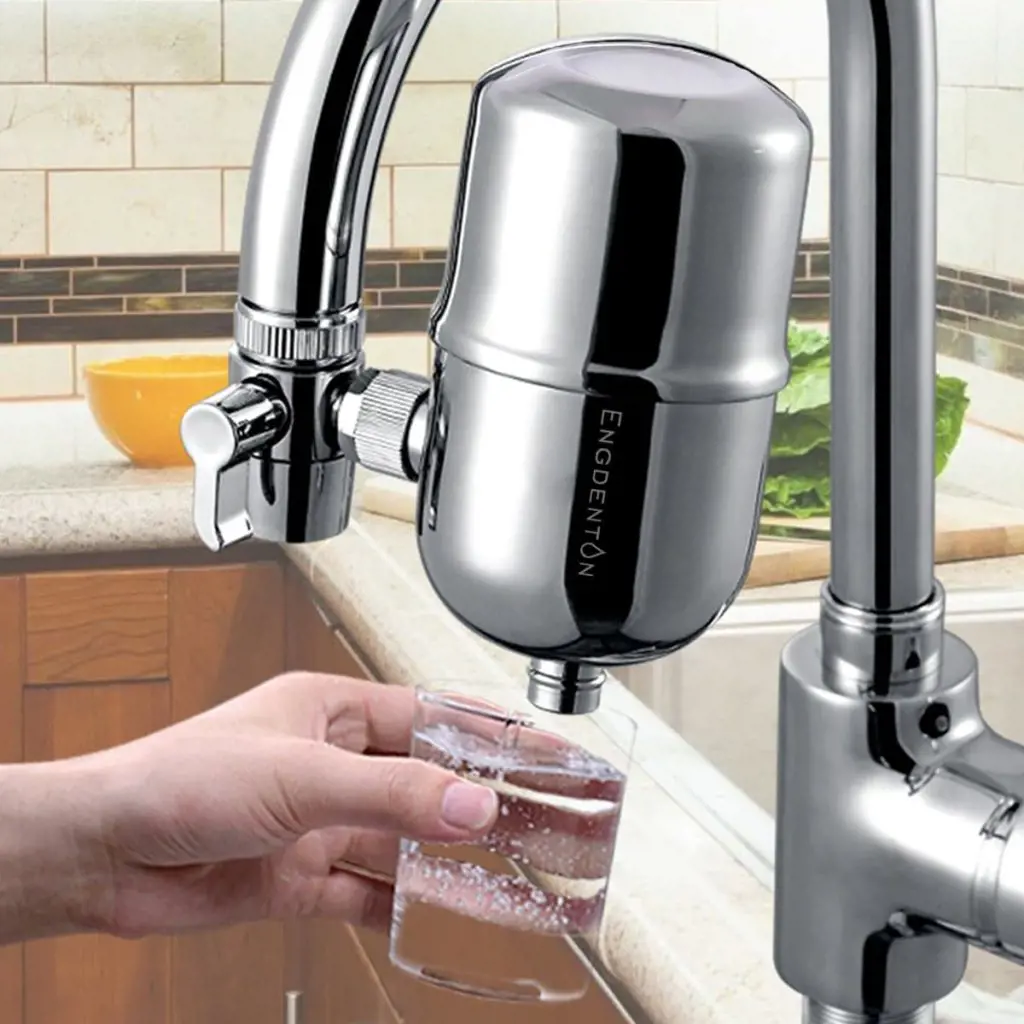
If you are concerned about the quality of the water you use for drinking and cooking, installing a water filter for your kitchen faucet is a smart choice. There are several types of water filters available on the market, each offering unique features and benefits. In this article, we will explore four popular types of water filters: activated carbon filters, reverse osmosis filters, ceramic filters, and UV filters.
Activated Carbon Filters:
Activated carbon filters are widely used in water filtration systems due to their excellent ability to remove impurities and improve water taste. These filters work by using activated carbon, which has a large surface area that can absorb and trap contaminants such as chlorine, volatile organic compounds (VOCs), and unpleasant odors. Activated carbon filters are effective in improving the taste and odor of water, making it ideal for drinking and cooking purposes.
Reverse Osmosis Filters:
Reverse osmosis filters are known for their exceptional filtration capabilities. These filters utilize a semi-permeable membrane to remove a wide range of impurities such as heavy metals, fluoride, bacteria, viruses, and other dissolved solids from the water. Reverse osmosis filters are highly effective in producing clean and purified water, ensuring that you and your family have access to safe drinking water.
Ceramic Filters:
Ceramic filters consist of a ceramic shell that contains small pores, allowing water to pass through while trapping impurities. These filters can effectively remove bacteria, protozoa, and other contaminants from the water. Ceramic filters are also known for their long lifespan and durability, making them an excellent choice for those looking for a low-maintenance and cost-effective water filtration option.
UV Filters:
UV filters utilize ultraviolet light to kill bacteria, viruses, and other microorganisms present in the water. These filters are typically installed alongside other filtration systems to provide an extra layer of protection against harmful pathogens. UV filters are highly effective in disinfecting water and are a great option for those who want to ensure their water is free from harmful microorganisms.
When choosing a water filter for your kitchen faucet, consider the specific contaminants you want to remove from your water and the filtration capabilities of each type of filter. It's also essential to check the manufacturer's guidelines and maintenance requirements to ensure that the filter is properly installed and maintained for optimal performance.
In conclusion, the selection of a water filter for your kitchen faucet depends on your specific needs and preferences. Activated carbon filters, reverse osmosis filters, ceramic filters, and UV filters are all excellent options for improving the quality and taste of your drinking water. Remember to regularly replace or clean the filter cartridge as recommended by the manufacturer to ensure the continued effectiveness of your chosen water filter.
How to Properly Tighten a Kitchen Faucet in a Deep Sink
You may want to see also

Factors to Consider When Choosing a Water Filter for Kitchen Faucet
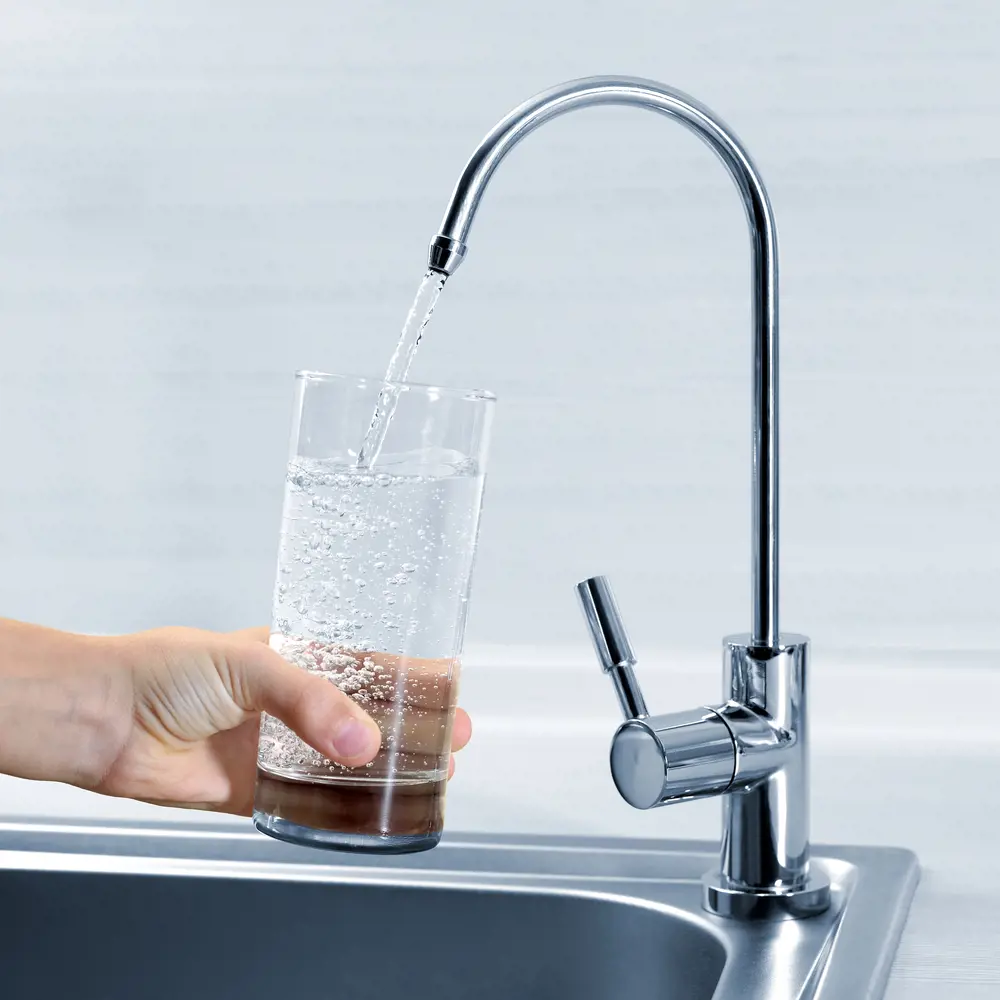
When it comes to choosing a water filter for your kitchen faucet, there are several important factors to consider. In this article, we will explore four key factors to help ensure you choose the right water filter for your needs: water quality and contaminants, filter lifespan and replacement cost, installation and maintenance, and budget and price range.
Water Quality and Contaminants:
The first factor to consider when choosing a water filter for your kitchen faucet is the specific water quality and contaminants in your area. Different regions have different water sources and potential contaminants that may vary. Conducting a water quality test or referring to your local water authority's report can help you identify the unique characteristics of your water. Common contaminants include chlorine, lead, arsenic, fluoride, and bacteria. Once you know the impurities present in your water, you can choose a filter that effectively removes or reduces those contaminants.
Filter Lifespan and Replacement Cost:
The filter lifespan and replacement cost are crucial considerations in choosing a water filter for your kitchen faucet. Filters have different lifespans, ranging from a few months to several years. It is essential to check the manufacturer's specifications regarding their filter's lifespan and the recommended replacement interval. Additionally, consider the cost of replacement filters, as this expense can add up over time. Some filters require only cartridge replacement, while others may require the whole filter housing to be replaced. Understanding the long-term maintenance costs associated with your chosen filter is essential.
Installation and Maintenance:
Another critical factor to consider is the ease of installation and maintenance of the water filter. Some filters require professional installation, while others can be easily installed by following the manufacturer's instructions. Consider your level of expertise and the availability of customer support when choosing a filter that suits your installation skills. Additionally, maintenance requirements should be taken into account. Filters may need periodic cleaning or replacement, and you should evaluate the ease and cost of servicing the filter.
Budget and Price Range:
Finally, your budget and price range play a significant role in choosing a water filter for your kitchen faucet. The cost of filters can vary significantly depending on the type of filtration technology, brand, and other factors. Consider how much you are willing to spend on the initial purchase, as well as the ongoing costs of replacement filters. While it may be tempting to opt for a lower-priced filter, it is essential to balance cost with the filter's effectiveness and long-term affordability.
In conclusion, choosing a water filter for your kitchen faucet involves considering various factors. Assessing your water quality and contaminants, filter lifespan and replacement cost, installation and maintenance requirements, and staying within your budget will help you make an informed decision. By taking these factors into account, you can select a water filter that best meets your needs, ensures the quality of your drinking water, and promotes the health and well-being of your household.
How to Easily Replace a Faucet Leak in Your Peerless Kitchen Faucet
You may want to see also

Top Picks for the Best Water Filter for Kitchen Faucet
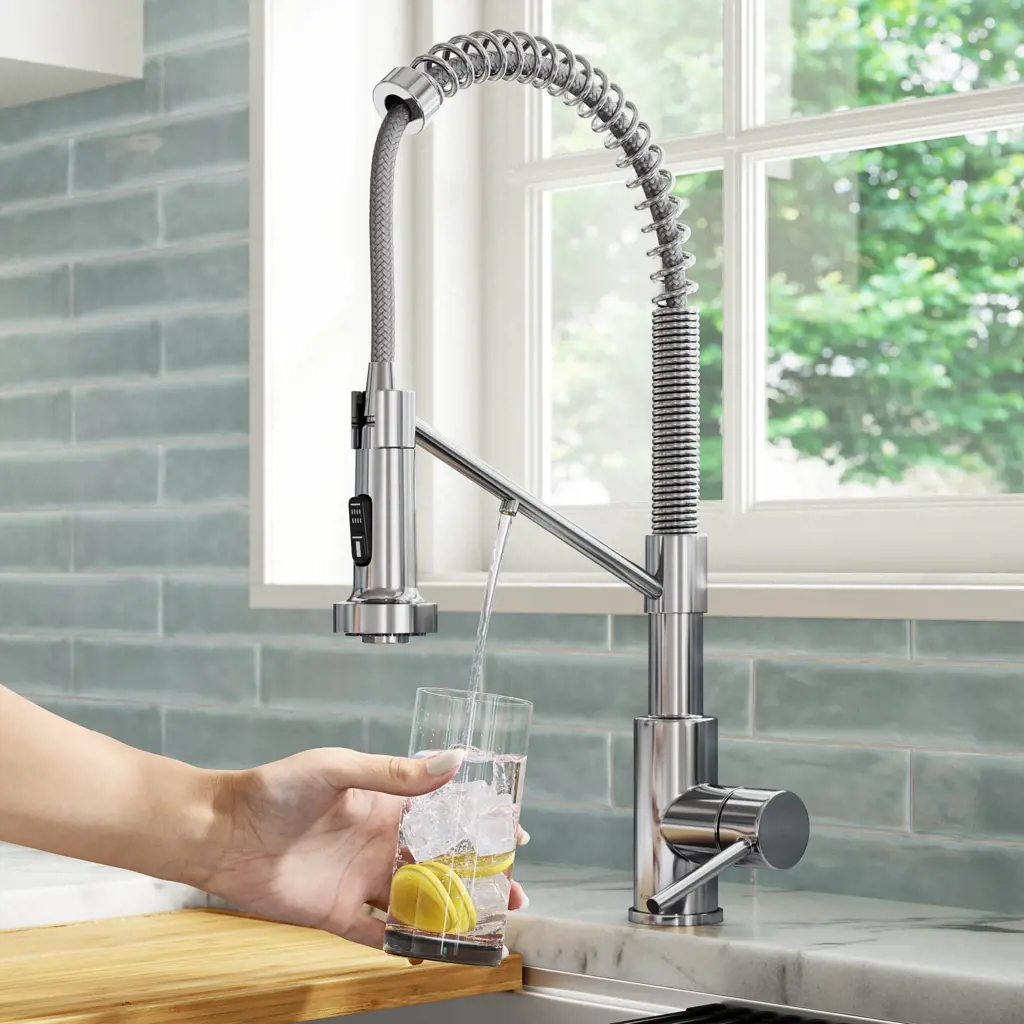
Brand A: Features, Pros, and Cons
When it comes to finding the best water filter for your kitchen faucet, Brand A is an excellent choice that offers a range of impressive features. Let's take a closer look at some of the features, as well as the pros and cons, of this brand.
Features:
- Advanced Filtration System: Brand A uses an advanced filtration system that can effectively remove contaminants such as chlorine, lead, bacteria, and sediment from your tap water. This ensures that you and your family enjoy clean and safe drinking water.
- Easy Installation: Installing a water filter from Brand A is a breeze. It comes with clear instructions and all the necessary components, making it a simple DIY project. You won't need to hire a professional plumber to get it up and running.
- Long Filter Life: The filters used in Brand A's water filters have a long lifespan, which means you won't have to replace them frequently. This not only saves you money but also reduces the hassle of constantly changing filters.
- Compact Design: Brand A's water filters have a sleek and compact design that won't take up much space in your kitchen. They can easily be installed on most standard faucets without causing any inconvenience.
Pros:
- Effective filtration: Brand A's water filters are highly efficient in removing contaminants, providing you with clean and fresh-tasting water.
- Easy installation: You don't need any special tools or skills to install Brand A's water filter. It's designed with user-friendly installation in mind.
- Long filter life: The filters used in Brand A's water filters have a long lifespan, reducing the frequency and cost of replacement.
- Compact design: The compact design of Brand A's water filters allows for easy installation on most standard faucets.
Cons:
- Limited compatibility: Brand A's water filters may not be compatible with all types of faucets. It's important to check if your faucet is compatible before purchasing.
- Water flow rate: Some users have reported a slight decrease in water flow rate when using Brand A's water filters. However, this is a minor inconvenience considering the benefits it provides.
- Filter replacement: While the filters have a long lifespan, the replacement filters can be slightly expensive compared to other brands. However, the cost is justified by their effectiveness and performance.
Brand B: Features, Pros, and Cons
Brand B is another top choice when it comes to the best water filter for kitchen faucets. It offers a range of features that make it a reliable and efficient option. Let's explore the features, pros, and cons of Brand B's water filters.
Features:
- Multi-stage Filtration: Brand B uses a multi-stage filtration system that can eliminate various contaminants, including chlorine, heavy metals, sediments, and volatile organic compounds (VOCs). This ensures that the water you consume is clean and free from harmful substances.
- High Water Flow Rate: Brand B's water filters are designed to maintain a high water flow rate, allowing you to have a steady supply of filtered water without any noticeable decrease in pressure. This is especially useful when you need a significant amount of filtered water for cooking or filling up containers.
- Easy Maintenance: The water filters from Brand B are designed for easy maintenance. They often come with a filter replacement reminder, indicating when it's time to change the filters. Replacement is a quick and straightforward process that can be done without any hassle.
- Durable Construction: Brand B's water filters are built to last. They are made from high-quality materials that are resistant to corrosion and can withstand daily use in a busy kitchen environment.
Pros:
- Effective filtration: Brand B's water filters use a multi-stage filtration system to ensure the removal of various contaminants, providing you with safe and healthy drinking water.
- High water flow rate: The water filters from Brand B maintain a high water flow rate, allowing for a steady supply of filtered water without compromising the pressure.
- Easy maintenance: The filter replacement reminder and simple replacement process make maintaining Brand B's water filters a breeze.
- Durable construction: The high-quality materials used in the construction of Brand B's water filters ensure durability and longevity.
Cons:
- Installation may require additional components: Some users have reported the need for additional adapters or connectors to properly install Brand B's water filters. This may add a small extra cost to the overall installation process.
- Slight taste alteration: A few users have mentioned a slight alteration in the taste of the filtered water. However, this is subjective, and many users did not experience any noticeable taste difference.
Brand C: Features, Pros, and Cons
Brand C is a reliable option for those seeking the best water filter for their kitchen faucet. With its impressive features, this brand stands out from the competition. Let's delve into the features, pros, and cons of Brand C's water filters.
Features:
- High Capacity Filtration: Brand C's water filters can handle a high volume of water, making them ideal for households that consume a significant amount of water. They are designed to provide a continuous supply of filtered water without compromising on efficiency.
- Quick Filter Replacement: The filters used in Brand C's water filters can be replaced quickly and easily. They often come with a twist-on/twist-off mechanism, ensuring a hassle-free replacement process.
- Space-Saving Design: Brand C's water filters are designed to be compact and space-saving, allowing for easy installation even in kitchens with limited counter space.
- Leak-proof Construction: Brand C's water filters feature a leak-proof construction, ensuring that no water is wasted during the filtration process. This not only saves water but also prevents any potential damage to your countertops or kitchen cabinets.
Pros:
- High capacity filtration: Brand C's water filters can handle a high volume of water, making them suitable for households with high water consumption.
- Quick filter replacement: The twist-on/twist-off mechanism of Brand C's water filters facilitates quick and easy filter replacement.
- Space-saving design: Brand C's water filters have a compact design that allows for installation in kitchens with limited space.
- Leak-proof construction: The leak-proof construction of Brand C's water filters prevents water wastage and protects your kitchen from potential damage.
Cons:
- Installation may require additional adapters: Some users have reported the need for additional adapters to properly install Brand C's water filters. This may add a small extra cost to the overall installation process.
- Water flow may decrease: A few users have experienced a slight decrease in water flow rate when using Brand C's water filters. However, this is a minor inconvenience considering the overall benefits of the filtration system.
Understanding the Base of Moen Kitchen Faucets: Does Every Model Have One?
You may want to see also

Tips for Maintaining and Extending the Lifespan of Your Water Filter
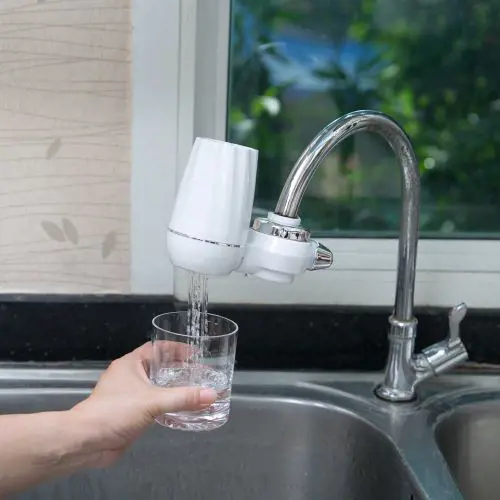
A water filter is an essential device to have in your home, as it helps ensure that the water you drink and use for cooking is clean and safe. However, to keep your water filter working efficiently, it requires regular maintenance and care. Here are some tips to help you maintain and extend the lifespan of your water filter.
Regular Filter Replacement
One of the most crucial aspects of maintaining a water filter is replacing the filter cartridge regularly. The lifespan of a filter cartridge varies depending on the model and usage, but in most cases, it is recommended to replace it every six months to a year. Over time, the filter will become less effective at removing impurities, and it may even become a breeding ground for bacteria. So, make sure to check the manufacturer's instructions for the recommended replacement schedule and stick to it.
Cleaning and Maintenance Schedule
Apart from replacing the filter cartridge, it is also important to clean and maintain your water filter regularly. Start by disconnecting the filter from the water supply and following these steps:
- Remove the filter housing and empty any remaining water.
- Separate the different components of the filter, such as the filter housing and the cartridge.
- Rinse each component with warm water to remove any residue or debris.
- Use a mild, non-abrasive cleaning solution to clean the inside of the filter housing and the cartridge. Be sure to follow the manufacturer's instructions and avoid using harsh chemicals that could damage the filter.
- Rinse all the components thoroughly and reassemble the filter.
To prevent the growth of bacteria, it is recommended to sanitize the filter housing periodically. You can use a solution of bleach and water or a specific sanitizing solution recommended by the manufacturer.
Flushing and Winterizing the Filter
If you live in an area with freezing temperatures, it is important to flush and winterize your water filter when the cold season approaches. Freezing can damage the internal components of the filter, rendering it ineffective. To winterize your filter, follow these steps:
- Shut off the water supply to the filter.
- Open the filter housing and remove the filter cartridge.
- Drain any remaining water from the filter housing by opening the release valve or using the built-in drain plug.
- Once the housing is empty, reassemble the filter and store it in a dry and protected area. Avoid exposing it to extreme temperatures.
Proper Storage and Handling
To ensure the longevity of your water filter, it is crucial to store and handle it properly. Avoid storing the filter in areas with excessive heat or direct sunlight, as this can degrade the materials and diminish its effectiveness. Additionally, keep the filter away from chemicals or substances that could damage it. When handling the filter, be gentle and avoid dropping or applying excessive force, as this can cause cracks or leaks.
By following these tips, you can maintain your water filter in excellent condition, ensuring clean and safe water for you and your family. Remember to reference the manufacturer's instructions for specific maintenance requirements, as different filters may have unique cleaning and replacement procedures.
Can You Recognize This Kitchen Faucet? A Guide to Identifying Different Kitchen Faucet Styles
You may want to see also
Frequently asked questions
There are several highly rated water filters for kitchen faucets on the market. Some popular options include the PUR FM-3700 Advanced Faucet Water Filter, the Brita Tap Water Filter System, and the Culligan FM-25 Faucet Mount Filter. Each of these filters has its own unique features and benefits, so it's important to consider your specific needs and preferences when selecting the best one for your kitchen faucet.
A faucet water filter typically attaches directly to your kitchen faucet and filters the water as it flows through the filter. These filters often use a combination of activated carbon and other filtration media to remove impurities such as chlorine, lead, and sediment from the water. Some filters also have additional features, like a sensor that indicates when it's time to replace the filter cartridge.
When choosing a faucet water filter, it's important to consider factors such as the filter's filtration capacity, filter lifespan, ease of installation and use, and the level of filtration it provides. You may also want to look for additional features like a filter change indicator, multiple water flow options, and compatibility with different faucet types.
The frequency with which you should replace the filter in a faucet water filter will vary depending on factors such as the filter's lifespan and your household's water usage. Some filters have a specified lifespan, typically ranging from two to six months, while others may require more frequent replacement. It's important to follow the manufacturer's recommendations for filter replacement to ensure optimal filtration performance.
Most faucet water filters are designed to be easy to install and typically come with detailed instructions and all the necessary components for installation. Many filters can be installed without the need for tools or professional help. However, it's always a good idea to read the installation instructions carefully and follow them properly to ensure a successful installation. If you're unsure or uncomfortable with installing the filter yourself, you may want to consult a plumber or seek assistance from a professional.







